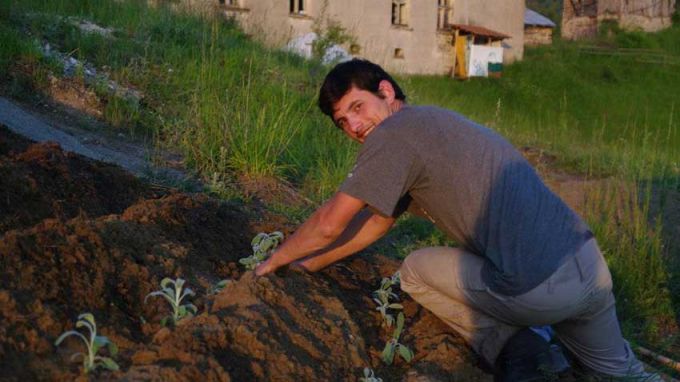 6
6
Dilapidated houses, crumbling under the burden of the years, courtyards, overgrown with weeds, an empty village square where there is no children’s laughter or even the sound of human voices, just an elderly man or woman here and there, nursing their youthful memories or saddened by the knowledge of their children having flown the nest.
This is a picture that can be seen in so many small towns and villages across the entire territory of Bulgaria. Even in a God-given corner of the country – the magical Rhodope Mountain. It is right here, in the very heart of the mountain, close to the border with Greece where the river Arda originates, that the village of Goudevitsa lies huddled, a village that is about to rise from the dead. The lifeblood for this comes from a group of young people who, drawn by this place’s magic, in time grew to think of it as their home. “We didn’t choose it. Places like this choose themselves,” says Teodor Vassilev, in an attempt to explain why they decided to settle here. Teodor is from the Valley of Roses, and his coming to Goudevitsa 12 years ago, is he says “purely coincidental”. He came across the abandoned, tumbledown building of the one-time local school and decided to bring it back to life. He restored it with the help of volunteers and in 2006 founded the Future Now culture community club. It was to become a centre that helped the young man’s idea of non-formal education, close to nature come true. Gradually, the idea caught on and other young professionals and enthusiasts came to Goudevitsa:
“None of us lives here 365 days of the year as yet,” Teodor says. “People with our way of thinking and way of life cannot stay put in just one place for the whole year. Master masons once lived in this village and part of the year they spent elsewhere. It is the same with us, and we feel it is only natural. This place is home to just 30 odd people and we come back here constantly, buy land, build houses. Of course, much of our lives we spend on the road in Bulgaria and sometimes abroad. Some of us now have temporary residence in the village, but living conditions here must improve. What Goudevitsa needs is infrastructure that will enable people to live here permanently together with their children.”
The young people spend 6 to 8 months of the year in Goudevitsa. To them it is an escape from the big city and a way to commune with nature. “Here you have all the time in the world – to grow your own vegetables, to play with your children, to help your neighbours, to sit down and think where you are heading and what you want to achieve,” Teodor says. But adds that life in the country does not exclude using new technologies and active communication. That is why he is hoping that this year the whole village will have wireless. “To us new technologies are a means, not a way of life,” he hastens to explain. The young enthusiasts are now building a house that will be used as an accommodation facility. It is entirely in the stonework architectural style, typical of the Central Rhodopes. “The saying My Home is My Castle is quite literal here,” Teodor goes on to say. Everything they have been doing is subject to traditional building methods and natural materials. “Inside, we use wood and coat the walls in clay that we obtain in the area, just as people did 100 years ago,” he says further. We organize all kinds of adventure and educational camps and volunteer events, but we are also experimenting with permaculture. “It is a higher level of organic farming and makes maximum use of nature. For example, instead of spraying crops with chemicals, you can use ladybirds against pests. Again, this is nothing new, it is something people used to do in the past,” Teodor explains.
“We grow our own vegetables and use them in the summer when children come for the camp here,” Teodor says further. “Our herb garden is blooming. Last year we planted some more moursal tea, we grow some endangered plant species like wild thyme, golden root, Echinacea, arnica. But we mostly concentrate on moursal tea, being an endemic species that is in the Red Book. We have tried our hand at growing Rhodope tulips and a certain kind of Rhodope lily that only grows in this part of Bulgaria. It is incredibly beautiful and blossoms in June. At the beginning of May we are organizing a permaculture farming course to kick off the seasonal work and to demonstrate to people from all over the country how to apply it in their own gardens, even the courtyard behind their apartment building. In permaculture we use absolutely everything: rinds, paper, cut grass, everything is composted and then returned to the garden as fertilizer. Last year we tried stockbreeding, we kept Karakachan horses. Now, we have enlisted the help of a local man from a neighbouring village because we realized they require a lot of care.”
Goudevitsa has now been attracting visitors from abroad.
“There was a man from Romania, who lives in Italy, who came to us in 2011. He spent two months here, under a European volunteer programme. He left, but then returned and stayed another 18 months. People accepted him as part of the community; they gave him food, while he helped the elderly. We constantly have people coming from abroad and staying 2-3 weeks. Last winter we had guests from Italy, They live in the country and in winter, when there is no work out in the fields, they travel the world. They adore places like this village. They talked to the local people about old farming methods that have been lost in Western Europe.”
English version: Milena Daynova